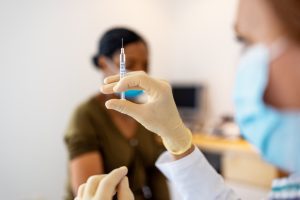Owens & Minor is excited to announce a 12-month Masterclass series that is focused on providing healthcare professionals relevant and timely continuing education. Masterclasses allow frontline healthcare professionals and leaders from all disciplines including nursing, allied health, healthcare leadership, supply chain, and more to “sharpen their saws” in a wide variety of topic areas with the goal of enhancing the safety, efficacy, and quality of care delivered. This Masterclass will focus on the following core areas:
- Patient and Healthcare Team Safety
- Core Practices of Infection Prevention and Control
- Healthcare Leadership
- Principles of Clinical Supply Chain
- Evidence-Based Practices
- Clinical Risk Management
- Teamwork and Communication
Join Our Webcast Mailing List
Each month, we will be hosting two 1.5-hour, continuing education interactive webinar programs. The first program of each month will focus on a specific clinical content area and then the second program of the month will center around the implementation of evidence-based practices across the continuum of care. The COVID-19 Pandemic has taught healthcare systems and professionals many valuable lessons, but the complexity of healthcare’s systems requires a systematic approach to improving safety, reducing the costs of care delivery, and optimizing the quality of clinical care provided across the entire healthcare. Every month, the series will build upon previous topics and conclude with a comprehensive year in review of healthcare safety, infection control, and application of evidence-based practices in December.
Masterclass Program Schedule:
February: Core Practices of Infection Prevention & Control
This webinar program will review the Top 10 Risks for Healthcare-Associated Infections that are faced by patients in both inpatient and outpatient settings. By addressing these top 10 risks to the patient, healthcare providers can decrease the overall risk for Healthcare-Associated Infections regardless of the clinical care setting.
This webinar program will discuss the implementation of the CDC’S Core Practices for Infection Prevention and Control in a variety of different clinical settings to include hospitals, outpatient facilities, and long-term care. By implementing these evidence-based practices across the entire continuum of care, Healthcare-Associated Infections can be dramatically reduced thru continuous effort.
March: Perioperative Best Practices for Infection Prevention
This webinar program will review the top causes and sources of Surgical Site Infections based on the most current data from the Centers for Disease Control and Prevention. In addition, this webinar will discuss the current evidence-based standards to reduce the overall incidence of Surgical Site Infections.
This webinar program will review the top causes and sources of Surgical Site Infections based on the most current data from the Centers for Disease Control and Prevention. In addition, this webinar will discuss the current evidence-based standards to reduce the overall incidence of Surgical Site Infections.
This webinar program will discuss the implementation of the AORN Guidelines for the prevention of Surgical Site Infections. This webinar will review evidence-based mechanisms to reduce and sustain reductions of Surgical Site Infections.
April: Healthcare Personnel Resilience
This webinar program will review the impacts of the COVID-19 pandemic on healthcare as a
sector and also the need to analyze lessons learned. This program will also discuss a full
postmortem analysis of the pandemic and evaluations at the global, federal, state, and local
levels.
This webinar program will focus on how healthcare professionals and leaders can diversity their professional skillset to ready them to achieve any goal that they desire. In addition, this program will discuss ways to sharpen your professional saw and demonstrate agility in any clinical environment to deliver exceptional care to your patients.
This webinar program will discuss the need for evidence-based resilience programs across the healthcare industry to preserve patient and healthcare team safety. In addition, this webinar will review common impacts of low resilience on frontline healthcare professionals and teams.
May: The Nurse’s Role in Infection Prevention & Interprofessional Collaboration
This webinar program will review the role of professional nurses in bedside care, management and leadership, and faculty positions and their impacts on patients and communities. Nurses play an instrumental role in delivering evidence-based care, and this care is part of a broader team that is focused on serving the patient.
This webinar program will focus on how healthcare professionals and leaders can more
effectively communicate across disciplines, improve outcomes, and decrease medical errors. The Team STEPPS methodology will be discussed and applied to de-escalate situations, improve communication, and create a culture of safety across all healthcare settings.
June: Clinical Risk Management and Improving Healthcare Quality
This webinar will review the common patient safety threats that face US healthcare facilities and how these breaches likely occur. In addition, the program will feature evidence-based approaches to improving patient safety, ensuring high-reliability care processes, and decreasing the potential for patient harm.
This webinar program will focus on how to reduce the incidence of medical device infections and cross-contamination by creating a comprehensive medical device hygiene and infection control program.
July: Innovation in Infection Prevention & Change Management
This webinar will review the value of innovation in optimizing clinical care. In addition, the use of change management skills can enhance care delivery and also reduce the potential for patient harm.
August: Respiratory Infection Prevention & Control
This webinar will review the most common respiratory infections found in both community and healthcare settings in addition to infection prevention strategies to mitigate spread across healthcare populations.
September: Patient Safety & Sepsis
This webinar will review the impacts of proactive and comprehensive patient safety programs in both inpatient and outpatient settings. Patient safety when part of the organization’s culture, can improve clinical outcomes, patient satisfaction, and reduce the costs of care delivery.
This webinar program will discuss the role of frontline healthcare clinicians in the recognition, response, prevention, and treatment of life-threatening sepsis in healthcare settings. In addition, this program will review the tools available in the Society of Critical Care Medicine Surviving Sepsis Campaign and their applicability across the entire healthcare continuum of care.
October: Infection Prevention & Control and Clinical Supply Chain
This webinar will review the evolving role of the modern Infection Preventionist in today’s healthcare environment. The Infection Prevention function must adapt to and overcome the many challenges faces by healthcare systems post-COVID-19.
This webinar program will review the core principles of objective product evaluation for
infection prevention and control products utilized in healthcare. This webinar will introduce an evidence-based product evaluation framework from the Centers for Disease Control and Prevention to assist value analysis and clinical professionals in confidently evaluating any new product technology.
November: Antibiotic Stewardship
This webinar program will review the core principles of Antibiotic Stewardship as defined by the Centers for Disease Control and Prevention. In addition, this program will review the role of medical staff leadership and executive leadership in optimizing prescriber behaviors with antibiotic usage.
About the Masterclass Series Faculty:
Hudson Garrett Jr., PhD, MSN, MPH, MBA, FNP-BC, IP-BC, PLNC, CFER, AS-BC, VA-BC, BC-MSLcert™, NREMT, MSL-BC, DICO-C, TR-C, CPPS, CCHR-S, CPHQ, CPXP, FACDONA, FAAPM, FNAP, FSHEA, FIDSA
Adjunct Assistant Professor of Medicine
Division of Infectious Diseases, Department of Medicine
University of Louisville School of Medicine
President and Chief Executive Officer
Community Health Associates, LLC

Dr. Hudson Garrett is an Adjunct Assistant Professor of Medicine in the Division of Infectious Diseases at the University of Louisville School of Medicine and a Faculty member for the newly created Center for Education and Training Infection Prevention which is a CDC-funded training center. He also co-founded the nonprofit the Infection Prevention Institute to help shepherd dissemination of best practices of infection prevention and control across the healthcare continuum of care globally. He holds a Graduate Certificate in Infection Prevention and Infection Control from the University of South Florida. He has completed the Johns Hopkins Fellows Program in Hospital Epidemiology and Infection Control. He is also a Fellow in the Academy of National Associations of Directors of Nursing Administration and was selected as a Lifetime Member in the Association, which is the highest honor bestowed upon a member. He is also a Fellow, the American Academy of Project Management, and a Senior Fellow and Ambassador of the Management and Strategy Institute. In 2019, he was inducted as a Distinguished Fellow and Practitioner in the National Academies of Practices. Dr. Garrett was recently selected in 2020 as 1 of 20 healthcare leaders globally to participate in the 2021 13-month Global Patient Safety Fellowship with the Institute for Healthcare Improvement and is a graduate of the IHI Patient Safety Executive Development Program. In August of 2021, Dr. Garrett was awarded the prestigious Fellowship Designation by the Society for Healthcare Epidemiology of America in recognition of his work in infectious diseases and infection prevention and control. In November 2021, he was awarded the Fellow Designation by the Infectious Diseases Society of America. He holds graduate certificates in healthcare leadership from both Cornell and the University of Notre Dame. He is an appointed member of the advisory committee for the Design Thinking in Healthcare Program at Rutgers University. He is a frequent international lecturer in the areas of infectious diseases, healthcare-associated infections, outbreak response and prevention and infection prevention and control. He has testified to the Centers for Disease Control and Prevention, Environmental Protection Agency, and Food and Drug Administration.
Continuing Education Information:
Each webinar is approved for 1.5 hours of Continuing Nursing Education by the California Board of Nursing. In addition, 1.5 hours of AHRMM Continuing Education credit will also be awarded for each program. Successful completion of the entire Masterclass will result in 36 Continuing Education Hours being awarded.
Masterclass Certificate of Completion:
This program is complimentary and those that successfully complete the entire program will receive a total of 36 hours of Nursing/Materials Management Continuing Education credits and an official digital Certificate of Completion that is suitable for framing.

















